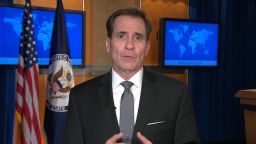Editor’s Note: CNN National Security Analyst John Kirby is a retired rear admiral in the US Navy who served as a spokesman for both the state and defense departments in the Obama administration. The views expressed in this commentary are his own.
Story highlights
John Kirby: It's a mistake to think Trump's hyperbole and the public chatter in the media and beyond don't have harmful effects
If Trump's game of chicken fails, then amid the devastation we will be left to contemplate how we went from leak to tweet to war
It is worth considering the degree to which public discourse – and President Trump’s contribution to it – have driven us to a potentially dangerous level of heightened tensions on the Korean peninsula.
Remember how this all started: with a Washington Post story on Tuesday morning that cited unnamed intelligence sources who divulged a classified assessment that Pyongyang had reached the ability to miniaturize a nuclear warhead.

Mr. Trump was asked later that day for his take on the article. That’s when we got “fire and fury” and the nasty little exchange of threats and challenges between Bedminster, New Jersey, where Trump is taking his vacation, and Pyongyang, all of which culminated in this tweet Friday by the commander in chief:
“Military solutions are now fully in place, locked and loaded, should North Korea act unwisely. Hopefully Kim Jong Un will find another path!”
Social and conventional media coverage of the tit-for-tat has fueled speculation, engendered discussion about worst-case scenarios, and at intervals prompted, if not provoked, President Trump to keep upping the ante.
Here’s part of the exchange he had yesterday with a reporter outside his clubhouse:
TRUMP: Let’s see what he does with Guam. If he does something in Guam, it will be an event the likes of which nobody’s seen before, what will happen in North Korea.
REPORTER: And when you say that, what do you mean?
TRUMP: You’ll see. You’ll see. And he’ll see. He will see.
REPORTER: Is that a dare?
TRUMP: It’s not a dare. It’s a statement. He’s not going to go around threatening Guam. And he’s not going to threaten the United States. And he’s not going to threaten Japan. And he’s not going to threaten South Korea. No, that’s not a dare, as you say. That is a statement of fact.
You can see and feel in just this little give-and-take the frantic, tightening spiral toward yet another threat.
Don’t get me wrong. This is newsworthy stuff. These are fair questions to ask the leader of the free world. And Trump should be made to comment and clarify his position. I do not fault reporters for doing their work, or commentators for providing their views. Nor do I question the Washington Post for publishing the original story (though I have grave concerns over the logic behind the leak itself. It wasn’t only criminal; it was reckless).
As an on-air analyst, I have been party to the discussion. But I believe all of us – in and out of government – should be mindful that, as we talk about current events, the way we talk about them can and often does affect them. Words and tone matter and can drive more than just the story. They can drive actual events.
Now, near as we can tell, no one’s finger is poised over any little red buttons. No US or coalition forces have been moved. No civilians have been evacuated. Aside from whatever preparations North Korea is making (or is not) to carry out its threat against Guam by mid-month, no other DPRK military action has been reported.
I’m going to choose to believe Mr. Trump is playing a game of chicken here, that he is trying to turn up the heat to a degree that even Kim Jong Un can’t stand, and that Washington is trying to force some sort of negotiated outcome. I hope it works.
But it’s a mistake to think his hyperbole and the frenetic public chatter don’t have deleterious effects. The war of words has already caused a dip in the stock market. It has certainly affected the public mood in Seoul, Tokyo, Beijing, and Guam – where residents are now reading leaflets that tell them, for example, not to look at the airburst of incoming bombs. And it has prompted world leaders from Germany, Japan, South Korea, New Zealand and Australia, just to name a few, to publicly call for calm and dialogue.
Indeed, just this morning Russia and China floated again the idea of trying to broker some sort of dialogue between the US and North Korea. Think about that for a moment: Russia and China playing the big boys to keep us little scrappers in line.
And think about this: what was different between the time we went to bed Sunday night and woke up Monday morning? Nothing, really, except the public exposure of something most experts – and our President – already knew: that Pyongyang was racing ahead to build a nuclear-armed ICBM.
There should be a peaceful resolution to all this. If it must come by way of Chinese and Russian intervention, so be it. But if that happens, we cannot grouse anymore about diminishing US leadership. We will have had a hand in it.
If I’m wrong, and this isn’t just a bluff, then amid the devastation we will be left to contemplate how we went from leak to tweet to war.





